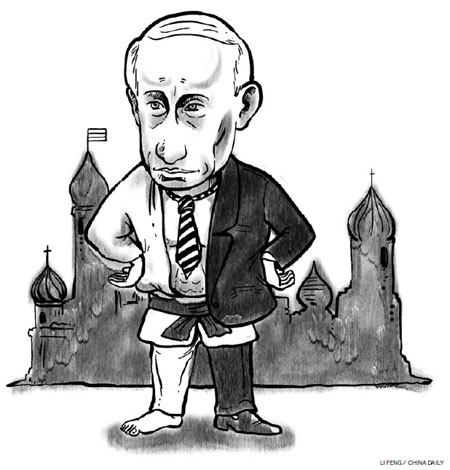Putin will show 'softer' side at home
- By Zuo Fengrong
 0 Comment(s)
0 Comment(s) Print
Print E-mail China Daily, May 7, 2012
E-mail China Daily, May 7, 2012

People may have different opinions about his victory, but one thing is certain, the powerful Russian statesman who bid farewell to Kremlin in 2008 is back: Vladimir Putin will be sworn in as president on Monday.
However, he faces a totally different Russia from four years ago and he will have to adapt quickly to the new conditions, which might affect his policies.
Putin portrays himself as a strong, determined leader, but in the Duma elections last December, the United Russia party, of which he is chairman, got less than half of the votes, during his new presidency, he may have to be "softer" domestically and embrace greater political diversification and democracy.
On April 24, Putin said he would step down as chairman of the party, and the out-going President Dmitri A. Medvedev will be the new party head.
Some analysts said Putin was distancing himself from United Russia because its image had been damaged. But Putin said he saw the role of president as one of "a consolidating figure for all political forces," and not affiliated with any one party.
Economic policies are unlikely to experience any great changes when he enters office. Putin will continue to propel the economic modernization initiated by Medvedev, and will introduce tax reforms to support agriculture and infrastructure construction. Putin admits the State-owed sector accounts for too high a percentage in the national economy and he will continue to develop a market economy and welcome private investment.
But while implementing market reforms Putin is also going to have to improve social welfare and medical treatment, and make good on his promise to provide housing for 60 percent of families.
Contrary to his domestic policy, Putin's foreign policy will probably become tougher, based on his view that the world should be multi-polarized, and in which Russia needs a greater say.
He will also emphasize cooperation with international organizations and mechanisms in defending Russia's national interests. Having said the global economic and political processes are unpredictable, Putin will seek to promote mutual trust among countries, especially among the G8 and G20 countries.
To support his global policy, Putin will pay special attention to the Commonwealth of Independent States through an integration process. At the same time he will try to improve relations with European countries to get more support for domestic reconstruction.
Of course, relations with the United States will remain a challenge. Russia has long sought an equal partnership with the US, but the later has increased its influence in Europe and the former USSR region. So US-Russian relations will actually depend on the US - if the US insists on a tough policy, Putin will be equally tough; but if the US respects Russia as an equal partner their relations will undoubtedly improve.
But the focus of his foreign policy will be the Asia-Pacific region. The 2012 Asia Pacific Economic Cooperation is going to be held in Vladivostok on the eastern Russian coast, and that is a great opportunity for promoting Russian-Asian relations. China will remain one of the most important friends for Russia. As Putin wrote in an article prior to the election: "Russia needs a prosperous and stable China, China needs a strong and successful Russia."
The two great powers will continue to support each other in dealing with regional and global issues. The economic interdependence of the two countries will also be consolidated. The Sino-Russian trade volume reached $80 billion in 2011 and they are targeting $100 billion in 2015 and $200 billion in 2020.
Of course, there are signs of Russia "containing" China, mainly by exporting weapons to Vietnam and India, and curbing China's influence in central Asia. These problems need China's attention, but the friendship and cooperation with Russia will remain the mainstream trend of their relations as they are mutually beneficial.
The author is a professor of international studies at the Central Party School. The article first appeared in the Study Times.





